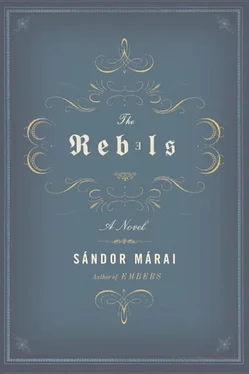THE DOCTOR’S SON LAY ON THE BED, STIFFwith cramp. His whole body was covered in sweat, and he felt feverish. He stared at the expanse of window in which the angles of the street, the single tree, a roof, and three further windows were slowly fading. A vertical line of smoke rose from the chimney opposite. By now it was darker in the low-arched room than it was outside. Through the window pressed the stifling early summer heat and in the steamy twilight the gas lamps outside glowed faintly green. Sometimes on spring evenings an invisible fog descends that lends a touch of green to the streetlights. The servant was singing and ironing in the kitchen. In the pane of the partly open window sputtered a ring of sparks from the iron: it was like the striking of a match in the darkness. The girl in the hallway was swinging the fiery metal box above her head.
He lay in a cramp, stared straight ahead, lost in thought. The gang had gone by three o’clock. Without transition it seemed to him that he had woken from some terrible nightmare and that everything would be all right now, he just had to be fully awake, step back into life, and, exercising his best charm and desire to please, make something of it. He gave a painful grin. Slowly he struggled upright, becoming conscious of his limbs, dangling his feet, gazing dreamily at the world around him. His movements were leaden as he raised himself from the bed, made his way to the basin, felt around in the darkness for the jug of water, lowered his head to the tray, and splashed the warm standing water over his damp hair and brow. Dripping with water, practically blind, he found the door and tapped around for the light switch. He sat down at the table and distractedly began to dry his hair with a thick towel.
The alarm clock was ticking on the bedside table. Seven o’clock; he was expected. He had been lying there for four hours, cramped, unmoving. He turned his head like a man with a tight collar, inserting his finger trying to adjust it for comfort. He found it hard to swallow. He went to the basin, washed his hands, rinsed his mouth, swilled the mouthwash round, gargled. Having stopped singing, the girl in the kitchen doorway noticed the light in the student’s room. The boy buttoned his collar and took a few steps round the room. His aunt would not be back before eight.
A long time ago, in his childhood, his aunt had told him that she would leave her treasure to him. That “treasure,” according to her, was stashed away in a secret place where no “agents and brokers” could get at it. Auntie hated the stock market, though she never really explained her loathing. In the child’s imagination the stock exchange remained a dark cave at whose mouth Ali Baba and the forty thieves were grappling with a few powerful, armed men determined to guard their treasure. The bad luck associated with Fridays also played a part in the aunt’s account whenever she spoke of treasure. She spoke of treasure often, with a significant emphasis, telling him that she had checked its secret location that day and that it was all right. Ábel should not worry about the future because the treasure would be his and their lives were almost certain to be free of further trouble. The boy once sought out the secret place, a tin box in the drawer of his aunt’s washstand, where he found some old, no longer valid Lombard Street bills, a few banknotes of the Kossuth era, and some worthless lottery tickets. Auntie’s treasure could no longer help him. He stood at the mirror staring at his creased face, then sat back down at the table. It was a moot point whether money was of any use now, he thought. Perhaps there were matters where money, and all that money could buy—time, travel, distance, health—was of no help at all. He sat before the desk. He pulled open the drawer where notebooks and sheets scribbled over with writing lay in a heap, picked up a poem, and read it. Forgetting all else he read it in an undertone, craning over it. The poem was about a dog lying in the sun. When had he written it? He couldn’t remember.
The girl appeared, stopped in the doorway, and asked whether he would be staying home for supper. She posed there lazily, leaning against the doorpost, one hand on her hip, with a teasing smile on her face. The student ran his eyes over her and shrugged. She had brought the sharp, piquant tang of the kitchen with her, a damp smell hidden in the folds of her skirt that made him wrinkle his nose. He asked whether his aunt had returned yet. No, she wouldn’t be home before eight, she replied.
Nowadays it seemed to him that there were moments when his whole life flashed past him. It was as if the change he had lived through had trapped everything he had experienced on the surface of his memory, so he could see his childhood, his father, and hear the lost voice of his mother, experience it all in individual movements of Aunt Etelka as she bowed before him. He looked around him amazed. The girl followed his eye movements, uncertain what to do.
The room was in a sorry state. The gang had wreaked havoc in it: torn books and magazines lay under the bed, one volume, Fidibus, was soaking in a pool of liqueur from an upturned bottle that gave out a hideous sweet-sickly stench. A muddy footprint was smeared across the plush cover of one of the chairs. Cushions were strewn about the floor. He had finished his exams at eleven in the morning and had waited in the schoolyard for the three members of the gang who had followed shortly after him in alphabetical order, and they had come directly back here to his place, taking no detours. Béla, the grocer’s son, only called his father once they had arrived, telling him that he had passed and that they should not expect him home for dinner. Tibor did not contact his family, keeping from them the news that despite his patently strenuous efforts he had failed; his critically ill mother could wait to find that out in the evening, or the next day come to that. This was such an insignificant matter for the time being, it counted for so little, they didn’t even mention it. In six weeks’ time they would be in uniform and, with one great effort, even if the training dragged on, they’d be out at the front by the end of August.
He sat down on the bed. He looked at the girl. If I were not so timid, not so lacking in courage, thought the student, I’d pull her to me and lay my head on her breast. A decent sleep is the cure for everything. Pity she smells of the kitchen, as I can’t stand kitchen smells, but that’s because I’ve had an upper-middle-class upbringing: my grandfather was a landowner and my father is a practicing doctor. There’s a reason for everything. It may not reflect well on me but sometimes a smell is more powerful than reason. It might be that she cannot stand my smell either, the way the Chinese find the smell of white men disgusting. There are certain barriers between people. The girl had been working there a year and the thought of her full body sometimes haunted his dreams and worked on his fantasy, and often, at moments of adolescent boyish regression, he imagined her as a model. She had a nice face, pale and soft, a blond pigtail amusingly perched on the crown of her head.
The girl started putting the room in order, and in an unintentionally quiet voice he asked her for a glass of milk. He took tiny sips of it, the bland standby drink of childhood, because for days on end they had been drinking wine and spirits, sweet sticky liquor that he quaffed with a stoical obligatory manliness though he didn’t like the taste of it, nor could his stomach digest it. Milk felt good, the drink of that other, lost world. He went to the wardrobe, took out a clean collar, and brushed his coat down while the girl tidied and made the bed.
Читать дальше












